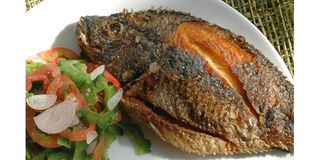Eating your way to better concentration

Apart from boosting one’s immunity and slowing premature aging, Tilapia also increases brain functionality because it is rich in Omega-3 fatty acids. PHOTO | COURTESY
What you need to know:
- Apart from boosting one’s immunity and slowing premature aging, Tilapia also increases brain functionality because it is rich in Omega-3 fatty acids that boost neurological function through oxygenation to the brain. Kwame says two servings of fish per week are sufficient.
Whether you are trying hard to finish a school project or complete a task at work, you must have a clear mind. However, this is impossible when one is hungry as they will battle with headache, brain fog and fatigue since the brain needs fuel to work optimally.
It is, therefore, important that one eats the right foods that help the brain deal with stress, reduce fatigue and boost overall brain functionality.
Blueberries
Blueberries are loaded with antioxidants that protect the body from free radicals, thus preserving the brain from damage. As a result, the brain is safeguarded from early onset of age-related conditions such as Alzheimer’s disease and dementia, Innocent Kwame, a nutritionist, says.
A study; Dietary intake of berries and flavonoids in relation to cognitive decline done on 16,010 people aged 70 and above also shows that eating blueberries slows cognitive decline and fights off Alzheimer’s disease among adults.
“Berries are high in flavonoids, especially anthocyanidins, which help in improving cognition,” it states.
Fish
While we are often advised to consume fish types that are hard to get here such as Salmon, tuna, and cod, Kwame says Tilapia and Nile Perch are also great for improved brain functionality.
“For instance, Nile Perch belly flaps yield oil up to 74 percent and this oil has several health benefits including improved brain health,” he says.
Apart from boosting one’s immunity and slowing premature aging, Tilapia also increases brain functionality because it is rich in Omega-3 fatty acids that boost neurological function through oxygenation to the brain. Kwame says two servings of fish per week are sufficient.
Coffee
Coffee improves one’s concentration and alertness. According to a study by John Hopkins University, coffee is a memory enhancer and the effects remain 24 hours later. However, Noeline Kisakye, a nutritionist, says it should be taken in moderation since it contains caffeine that can cause nervousness, insomnia and benign heart palpitations.
Nuts
These are high in omega-3 fatty acids that support the brain’s cognitive abilities. Kisakye says they also have selenium, manganese, copper and zinc, micro-nutrients that are needed for healthy neurological functionality.
“They also have vitamin E that is said to reduce cognitive decline as one ages,” she says.
Therefore, rather than go for a bag of crisps, get yourself some nuts for a snack or add them to your salad and smoothie to harvest the benefits.
Dark chocolate
Just like coffee, dark chocolate contains stimulants that enhance one’s level of concentration and focus. Cocoa, Kwame says, contains stimulant substances such as caffeine and theobromine, which are said to better brain functionality in the short term.
In a study; Effect of Cocoa and Cocoa Products on Cognitive Performance in Young Adults it was noted that eating cocoa that is high in flavanol can improve blood flow to the brain among young adults. This may explain why eating cocoa daily appears to improve attention, verbal learning, and memory.
Leafy green vegetables
Broccoli, spinach, kale, nakati, jjobyo, and lettuce fall in this category and are a great energy source.
Energy is essential when one is focussing and these green leafy vegetables avail that when consumed, Kisakye shares.
As such, when making a salad, a combination of leafy vegetables, avocado pumpkin seeds and grilled chicken or fish will do one’s brain and general health a lot of good.
She adds that these vegetables are rich in Vitamin K and lutein that slow cognitive decline and help in fighting the early onset of Alzheimer’s disease.
Whole grains
Eating whole grains lowers bad cholesterol in one’s blood because the foods are not high in bad fat which deposits plaque in the blood vessels.
“That enhances blood flow, which is essential for brain functionality. Whole grains include whole wheat but can also be boosted by whole grain foods such as brown rice,” Kwame shares.





